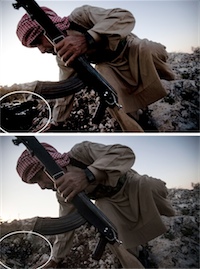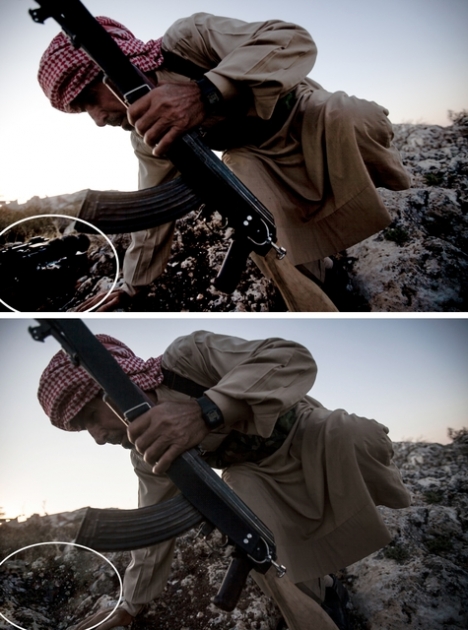Edited Out: AP drops award winning photographer over Photoshop fiddling
posted Thursday, January 23, 2014 at 1:09 PM EDT

The Associated Press has officially cut ties with the Pulitzer winning photographer Narciso Contreras, and has removed all of his images from their service, after discovering he altered one of his images. The photo in question had a video camera clone-stamped out from the lower left corner, leaving the primary subject unchanged, but falling far enough afoul of the AP's ethics to have him removed from the network.
Contreras was one of five photographers who received the Pulitzer prize in 2012 for his work in the Syrian conflict, and it was another shot from Syria that landed him in all the trouble. The AP has since gone through his entire back catalog, and confirmed that this was the only image of his that was edited in this way. What's peculiar is that it's not really a desperately necessary edit. The video camera in the corner of the frame is not invasive, and would be pretty hard to spot if you didn't know it was there.
So why in the world did Contreras edit that one single image? He must have known that such a move was against AP regulations, and could potentially land him in hot water. And it's such a minor element of the final picture—it's hardly like it's as intrusive as the fencepost in the famous Kent State image.
On the AP's blog, Vice President and Director of Photography Santiago Lyon said:
“AP’s reputation is paramount and we react decisively and vigorously when it is tarnished by actions in violation of our ethics code. Deliberately removing elements from our photographs is completely unacceptable and we have severed all relations with the freelance photographer in question. He will not work for the AP again in any capacity.”
And the AP's guidelines specifically say "No element should be digitally added to or subtracted from any photograph," and Contreras obviously broke the rules. Contreras himself expressed regret at the edit, saying he thought the camera was a distraction, and is quoted saying:
"I took the wrong decision when I removed the camera ... I feel ashamed about that. You can go through my archives and you can find that this is a single case that happened probably at one very stressed moment, at one very difficult situation, but yeah, it happened to me, so I have to assume the consequences."
The question then is if the AP's reaction was proportional to the crime—which is where we'd like to hear our reader's thoughts. Is the fact that it's the only time he's done something like this, and that it's a fairly minor part of the frame, enough that the sentence should be lighter? Or does the AP need to keep its reputation unblemished, so has to come down hard on edits like this?

Meanwhile, here are some unused headlines that we kicked around for this piece:
"Photoshop clone stamp: destroyer of careers"
"Content-aware firing: AP freelancer loses job over photo editing"
"Photoshop clone stamp: dashing careers, hopes, dreams since 1990"
"Don't be dodgy: burn, don't stamp"